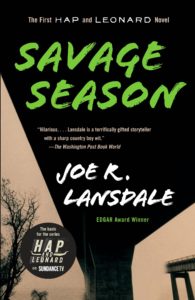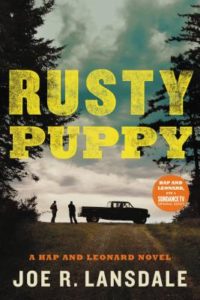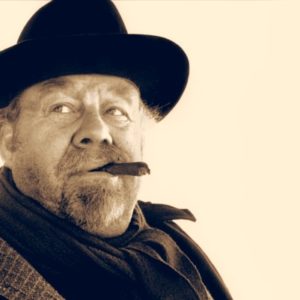Joe Lansdale’s Hap and Leonard books make up one of the most unique series in crime fiction. East Texas liberal redneck Hap Collins narrates his misadventures with gay, black, republican and, lethal buddy Leonard Pine that often veer into the violent and sometimes surreal. The stories cover a lot of territory, with indictments of racism, right wing politics, and the dangers of organized religion, yet always carrying a through line about the power of friendship and the families you create.
“I think I always feel like I’m going home with those guys.” Joe explains. “Hap has a similar past to my own, and Leonard is like a number of people I know combined, and actually has a lot of me in him as well. Hap’s voice is so natural to me. The genre engine that drives the stories satisfies why I became a reader in the first place, and then a writer. I love genre storylines, but I also love more literary aspects of style and character, and dialogue grows out of character. It’s bigger than life dialogue as Hap and Leonard are bigger than life characters. They seem everyday in a way, and that is part of their appeal, a certain authenticity, but at the same time they are bigger than life.”
If you’re a fan of the series, you have gotten used to the breaks Joe takes from it to work on other books. Before this latest hiatus from The Boys (as he often refers to them), Joe has left us a collection of short stories, Of Mice And Minestrone, to hold us over until their return, while he takes on other literary pursuits. The pause also gives us a chance to look at the novels of the past, which can be broken up into four separate trilogies.
___________________________________
Life In Limbo
___________________________________
For a series known for great action, dialogue that snaps, and wild plots, the first few books find Hap and Leonard stuck in a rut for the last decade and basically accepting it. It’s through these first few trials and tribulations they begin to wonder about their place in life.
The first book, Savage Season, has them stuck in one of their many dead end jobs (often ones Joe had in his youth) as rose field workers. Both opportunity and trouble come knocking in the form of Trudy, the woman who served Hap divorce papers to him while he was imprisoned for refusing the draft. She gets the two involved in the search for a car at the bottom of a creek Hap’s familiar with that contains cash from a decades old bank robbery, that she will split with them and her leftist friends. However, the leftists are involved with a group of drug dealers and things go brutality sideways.
Partly meant to be a homage to the Gold Medal crime fiction paperbacks of the fifties and sixties, as well as view of the sixties in the eighties, Joe puts a unique spin on the topes, particularly with Trudy. She is introduced to us as a Texas version of the femme fatale, with Leonard wary and Hap, thinking of fonder times, following her like the doomed noir hero. As the story deepens, she becomes more complex, showing contradicting behavior and earning the kind of sympathy you often don’t get for that kind of character. This becomes very apparent in a torture scene that shows her true measure. The moment even inspired the cover of the original paperback.
Savage Season was planned as a standalone, but Joe found himself working on a book that didn’t seem to be firing on all cylinders.
“I wrote an entire book, but it wasn’t working for me. I had a discussion with my editor, and I went home and started over. I realized the characters in the book I had written were actually versions of Hap and Leonard. Different, but there were enough elements there that I concluded I was really trying to write about them, and as soon as I sat down and started Mucho Mojo, it took off. I felt it was a lot simpler than the book I had written, but also a lot more engaging.”
In Mucho Mojo, the focus is more on Leonard, who inherits his grandfather’s house. The man took Leonard in and taught him all of his survival skills, then kicked him out because of his homosexuality. His history with the man becomes more complicated when the skeleton of a baby is found in the floor boards. Hap helps him find the truth and later clear Leonard when he becomes a suspect.
In many ways, this is the first true Hap and Leonard novel in the ways we’ve come to know the series. It includes many of the supporting characters, like police (later private) detective Marvin Hanson, who Joe brought over from his dark (and I mean dark!) serial killer novel Act Of Love. There is the stronger blend of hard-boiled crime fiction and laugh out loud satire. It also has the recurring look at race relations by having Hap get involved with Leonard’s black lawyer Florida.
That theme is delved into even deeper with Two Bear Mambo. When Florida goes missing, the boys search for her in a town with strong ties to the Klan. Her disappearance is linked to the lost recording of a historic bluesman and the more Hap and Leonard dig, they take on more of the town.
___________________________________
MID-LIFE CRISIS
___________________________________
This cycle could also be called “Getting Too Old For This Shit”. Hap and Leonard question their life choices more or at least comment on them more often in these next three books. Hap begins to realize he possibly has the last chance to change himself. Much of this has to do with a beautiful, opinionated red head.
Bad Chili works as a good transition into this. Hap is on his own more, having to clear Leonard for the murder of his ex-lover’s biker boyfriend, Horse Dick. Leonard falls into a web involving gay bashers, bikers, and a chili magnate.
The book also brings in a both supporting and recurring character. One is P.I. and pig farmer Jim Bob Luke, another character from an earlier book, Cold In July. Hap also meets his girlfriend Brett, a foul-mouthed nurse, who treats him after an encounter with a rabid squirrel. Brett proves to be a wonderful romantic foil for Hap, calling him on his crap and holding her own in bantering with him and his buddy.
“Brett is a favorite character. I would like to write more about her, as I think she’s sort of fallen to the rear of the books as of late.”
Rumble Tumble follows his relationship with Brett as the two of them and Leonard try to rescue her prostitute daughter who has been sold to a group of Nazi survivalists with a compound in Mexico. One of the most violent of the books up to that point, Lansdale begins to throw a more surreal shade, especially with the questionable characters they are forced to throw in with, including a preacher turned hitman and a gangster dwarf decked out in western gear.
Captains Outrageous is where Hap deals with his midlife crisis the most. Working as security guard at a chicken processing plant, he saves the bosses daughter from an assault. Rewarded with cruise for two, he takes Leonard, being on the outs with Brett. The trip makes one of those virus ships look good, ending with Hap and Leonard stranded in Mexico. Hap gets involved with a shady lady on the way to the border and a murder investigation back home when an old friend mistaken for him gets killed. By the time this wild story comes to an end, Hap is back with Brett and considers going back to school.
___________________________________
THE VANILLA RIDE TRILOGY
___________________________________
Hap and Leonard up to their lives more as they’re put more on the line than ever before. Both of these things are put to the test with assassin Vanilla Ride.
“I have no idea where she came from, but I’m glad she showed up. Hap and Leonard just showed up as well, but I can see their roots easier. Vanilla probably grows out of a long tradition of thriller novels.”
The first book in the trilogy is named after her. She is sent after the two after a string of others sent by the Dixie mob. The boys cross the organization when they try to rescue Marvin’s daughter from her drug dealing boyfriend who is in business with them. The rescue doesn’t go quit as planned. The only thing that saves them from the lethal Vanilla is her attraction to Hap.
In Devil Red, Hap and Leonard have to call in her lethal skills. It happens after they contract out to Marvin’s PI agency with a case that brings them back up against the Dixie mob as well as wanna-be vampires and a serial killer who is the scariest thing they’ve encountered since Vanilla. To bring her back into the mix, Hap must deal with his attraction to her and love for Brett.
Honky Tonk Samurai finds the two with steady work when Brett buys Marvin’s agency. The case of a missing woman connected to a used car/prostitution ring that forces them to bring in almost every Surviving ally, including Jim Bob Luke and Vanilla Ride, to deal with a family of inbred cannibal assassins before they get to the boys and their families, that now includes Hap’s newly discovered daughter Chance. The book ends with Hap teetering on death.
___________________________________
THE DOMESTICITY TRILOGY
___________________________________
After his near-death experience, Hap has come to terms with his life. He’s certain he wants to build a life with Brett and connect with Chance. It is the closest he and Leonard have ever been to being stable. Now, they really have something to lose.
In Rusty Puppy, they are hired to investigate the possible murder of a young black man by the hands of the police. The search for the truth takes them to a corrupt nearby county and an illegal fight game where the two friends are forced to battle one another in a grueling match. This is probably the most damning of society since Two Bear Mambo. It also has Hap proposing to Brett.
Jackrabbit Smile begins at their wedding reception. A family of Pentecostal white supremacists crash it, asking their agency to help find their missing daughter involved with a group nastier than themselves. This book takes a scathing look at religion and shows a heart-breaking side of bigotry.
The novel before the current Hap and Leonard hiatus, Elephant Of Surprise, gives a story that strips everything down to basically just the two of them. Told in less than a day, it follows the two in one day. During the worst storm in East Texas, as the two run from an ever-increasing amount of Dixie Mob thugs as they try to protect a witness they stumble upon. This is a relentless read that takes Hap and Leonard back to their Gold Medal roots.
Before Joe momentarily leaves the boys to apply his hand at other things, he delivered a collection of short stories, Of Mice And Minestrone. Like his mosaic novel, Blood and Lemonade, it takes back to their early years, long before Savage Season, and mixes the satirical with the somber.
“I think nostalgia is an appealing thing, but it is also full of land mines and traps. Youth allows you to gloss over things, or not see them, and old age allows you to believe the gloss. I try to give a bit of both in those stories. There were great things about the Fifties and Sixties, but there were bad things too.”
The first two are solo stories with Hap. His recollections of food, family, and imagination are captured in “The Kitchen”. It is reminiscent of the way Ray Bradbury used his own childhood for Dandelion Wine. The title story is a coming of age tale with a teenage Hap’s involvement with a woman being abused by her man, learning futility is a part of heroism.
The next two are Hap and Leonard stories with Lansdale’s familiar satirical touch. “The Watershed” chronicles their first attempt to get a drink in a bar that incites something between a bar brawl and a riot. “The Sparring Partner” is a boxing story where they help out an inexperienced fighter get out of the game that ends up with hap climbing into the ring.
Joe gets shows a more serious tone with “The Sabine Was High”. It follows them on a camping trip they take after Leonard has just returned from Vietnam. They each share their experiences from war and prison, lightly debating their politics, but clearly conveying the respect each has for the other for standing up to their convictions, connecting to the horrors they’ve been through. Joe subtly examines their friendship and creates one of his most poignant pieces of writing.
“I think Hap and Leonard, each in their own way, are dealing with bad memories. In the books I make a point of those things being important in their past, but I don’t explore those elements much, as I think those are deep wounds for them. ‘Sabine is High’ is them touching on those things, and expressing things about their experiences, without touching on it too directly. In this case, Leonard, more than Hap. It’s what they don’t say in that story that makes it work for me. There’s calm and tension at the same time. Smooth water on top, an undertow under the smooth water. Everyday elements mixed with dark energy. It’s also a chance for me to explore my other interests as a writer.”
The collection is wrapped up with some recipes of dishes mentioned in the stories, explained by Hap Collins (via Joe’s daughter Kasey). “The Mexican Mess” is a great take on comfort food.
“Food is in all the stories to some degree, and it’s a part of all the Hap and Leonard books, even if it’s just touched on from time to time. Kasey was perfect for that.”
Joe Lansdale is already at work on his Hap and Leonard hiatus. His buddy novel, Jane Goes North, is already out by Subterranean Press and Mulholland published his riff on James M. Cain, More Better Deals, in July. That said, you can bet Of Mice and Minestrone won’t be the last we see of the boys.
“I very much write from the subconscious and my subconscious needles me from time to time. I don’t know what it’s trying to tell me about them, but it’s telling me something. When it bakes an idea up, I feel an emotional need to write about them, and then the story pretty much falls out. Not that way with everything else.”





















